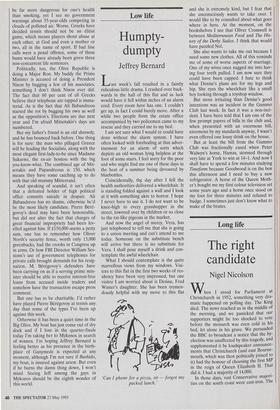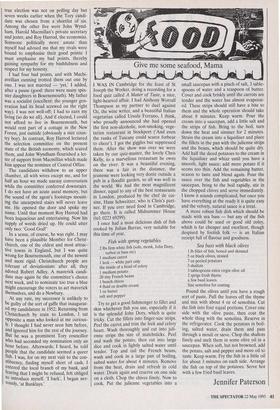Long life
The right candidate
Nigel Nicolson
In those days, vast Conservative majori- ties on the south coast were cast-iron. The true election was not on polling day but seven weeks earlier when the Tory candi- date was chosen from a shortlist of six. Among the other five were John Wynd- ham, Harold Macmillan's private secretary and jester, and Roy Harrod, the economist. Someone politically more astute than myself had advised me that my rivals were bound to emphasise their good points: I must emphasise my bad points, thereby gaining sympathy for my bashfulness and respect for my honesty.
I had four bad points, and with Machi- avellian cunning trotted them out one by one. I was not married — 'yet,' I added, after a pause (good: there were many spin- ster daughters in Bournemouth). My father was a socialist (excellent: the younger gen- eration had its head screwed on the right way). I was not well-off; I had to earn my living (so do we all). And if elected, I could not afford to live in Bournemouth, but would rent part of a cottage in the New Forest, just outside (obviously a nice coun- try boy). In contrast, Roy Harrod lectured the selection committee on the present state of the British economy, which scared them, and John Wyndham flourished a let- ter of support from Macmillan which made him appear the nominee of Central Office.
The candidates withdrew to an upper chamber, all with wives except me, and for half an hour we made uneasy conversation while the committee conferred downstairs. I do not have an acute aural memory, but the sound of the agent's footsteps mount- ing the uncarpeted stairs will never leave me. He opened the door and spoke my name. Until that moment Roy Harrod had been loquacious and entertaining. Now his supply of words dried up. He could utter only two: 'Good God!'
In a sense, of course, he was right. I may have been a plausible Member for Christ- church, one of the oldest and most attrac- tive towns in England, but I was quite wrong for Bournemouth, one of the newest and most rigid. Christchurch people are tolerant of deviationism: after all, they adored Robert Adley. A maverick candi- date may again be the committee's choice next week, and to nominate too true a blue might encourage the voters to act maverick themselves, and do a Newbury.
At any rate, my successor is unlikely to be guilty of the sort of gaffe that inaugurat- ed my candidature in 1952. Returning from Christchurch by train to London, I sat opposite a man who looked at me curious- ly. I thought I had never seen him before, and ignored him for the rest of the journey. But he was a prominent Tory councillor who had seconded my nomination only an hour before. Afterwards, I heard, he told people that the candidate seemed a queer fish. I was, for on my next visit to the con- stituency, finding myself short of cash, I entered the local branch of my bank, and fearing that I might be refused, felt obliged to introduce myself. 'I bark', I began ner- vously, 'at Banklays.'



















































 Previous page
Previous page